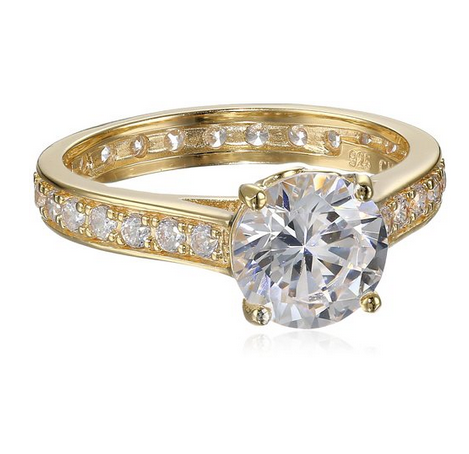Yellow Gold Plated Sterling Silver Cubic Zirconia Solitaire Ring
History
In 1937, Cubic Zirconia was first discovered by German mineralogists, M. V. Stackelberg and K. Chudoba. Little did they know, the tiny crystals that they discovered would move on to become a popular synthetic gemstone. It wasn’t until the 1970s that Cubic Zirconia was first used in the jewelry world, when scientists began growing the crystals in the laboratory. In the 1980s, Cubic Zirconia use in jewelry continued to grow and today is it one of the most popular diamond substitutes available on the market.
Composition
Cubic Zirconia is the cubic form of zirconium oxide that is created in a laboratory. Its durable material allows the synthetic stone to be molded into a variety of shapes. The stone offers brilliant shine and flawless clarity. Cubic Zirconia is available in a wide range of colors, including a colorless form that is an economically important competitor to natural diamonds.
Caring For Your Cubic Zirconia Jewelry
Like natural diamonds, Cubic Zirconia needs to be cared for in order to maintain its original brilliance and shine. Clean with warm-to-hot water and a soft brush with a mild soap, then immediately dry with a clean cloth after rinsing. Avoid contact with perfume, body lotion, hairspray or any other chemical that may harm the shine of the stone.
Jewelry Information
| Brand, Seller, or Collection Name | Amazon Curated Collection |
|---|---|
| Metal stamp | 925 Sterling |
| Metal | yellow-gold-plated-silver |
| Gem Type | Cubic zirconia |
| Minimum total gem weight | 4.02 carats |
| Setting | 4 Prong setting |
| Width | 2.88 millimeters |
| Length | 0.31 inches |
| Total metal weight | 2.3 Grams |
| Ring size | 7 |
| Resizable | No |
| Number of stones | 27 |
| Model number | S4AAMP97AC |


















